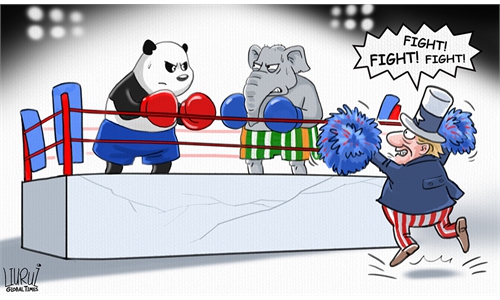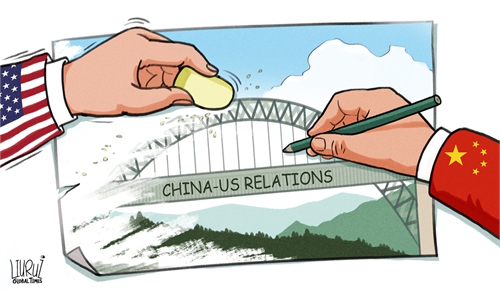After five months of strained ties, US admits Chinese balloon did not collect information

US' balloon hysteria. Graphic:GT
After repeated hyping of the so-called Chinese spy balloon incident for nearly five months, the Pentagon on Thursday admitted the airship did not collect any information, not to mention send any data back to China. This is an objective result that should be welcomed, but it came too late, as the incident has damaged mutual trust, totally changed the environment for communication between China and the US, and caused the two sides to miss a better time to restore relations, Chinese experts said.
Analysis of debris collected from a Chinese balloon drifting into the sky over the US and shot down by the latter in February showed that "it did not collect [any information] while it was transiting the US or over flying the US" despite that it "had intelligence collection capabilities," Pentagon spokesperson Brigadier General Pat Ryder told media on Thursday.
A Chinese balloon spent a week in February flying over the US and Canada before it was shot down by a fighter jet off the Atlantic coast, on orders from President Joe Biden. Although Chinese authorities reiterated that the balloon was a civilian weather balloon, some US media and hawkish politicians continued to hype it as a spy balloon, underscoring the increasing tensions between the world's two largest economies.
In response, Chinese Foreign Ministry spokesperson Mao Ning said at a press conference on Friday that China has reiterated on many occasions that the Chinese civilian airship drifting into the sky over the US was an unintended, unexpected and isolated event caused by force majeure. Calling the airship a "spy balloon" and claiming it is used to collect intelligence is total slandering and smearing, Mao stressed.
Citing some anonymous officials, a Wall Street Journal report on Thursday claimed that the balloon was found to be carrying some American-made equipment helping it to collect photos, videos and other information. Ryder did not confirm the report on Thursday when he announced the result of the Pentagon's analysis.
The Pentagon's brief announcement on Thursday showed that the US, or at least the US' defense department, is trying to close the chapter on the incident as it must have realized that the facts are slapping them in the face, Lü Xiang, a research fellow at the Chinese Academy of Social Sciences, told the Global Times on Friday.
"We should welcome the move, but I have to say that it is far from enough. The US hyping damaged the basic mutual trust between China and the US and set a bad precedent in dealing with a foreign country's civilian facility by using the military to shoot down the balloon. They should express regret for the decision," Lü said.
The balloon incident fundamentally changed the atmosphere between the two countries. Blinken postponed a reported visit to Beijing. This led to a delay in the progress of China-US interactions of about five months for no good reason, which is very unfavorable given the already high tension between the two countries, Lü noted.
Secretary of State Antony Blinken was said to have been planning a diplomatic trip to China before the balloon incident, but reportedly postponed the plan soon after it occurred. The trip was rescheduled and Blinken visited Beijing in June.
However, the US Department of Defense's Defense Security Cooperation Agency on Thursday approved new arms sales to Taiwan worth $440 million. The arms package is to include 30mm ammunition, spare parts for wheeled vehicles and other items, according to media reports. This is the 10th arms-sales package to Taiwan made under US President Joe Biden.
China urges the US to abide by the one-China principle and the provisions of the three China-US joint communiqués, stop selling weapons to Taiwan island, stop creating factors that lead to tensions in the Taiwan Straits and stop damaging the peace and stability in the region, Mao Ning said in response to the deal at the Friday press conference.
The US is building Taiwan island into a powder keg and ammunition depot. This is not "protecting" or "defending" the island but damaging and ruining it, the Taiwan Affairs Office of China's State Council said Friday, slamming the deal.
Earlier this week, a US bipartisan congressional delegation led by House Armed Services Committee Chairman Mike Rogers landed in Taiwan for a three-day visit.
We must face the fact that US diplomacy will continue to show a character of being two-faced, as it views China as a main strategic opponent and will not change its strategy of containing China before it regains an absolute advantage over China, Lü said.
The Chinese central government must have become aware of this and is making adjustments in its strategy in the Taiwan Straits and the South China Sea to maintain China's practical control of the regions amid the US' provocation, Lü pointed out, citing China's firm actions in the Taiwan Straits since last year including large-scale military drills and the flying of fighter jets across the so-called median line of the Taiwan Straits, which the Chinese mainland had declared a non-existent concept.
Some experts expect more windows of opportunity in China-US relations to open after US Treasury Secretary Janet Yellen was reported to be planning a trip to China in early July, but they also warned that the window will not be open for long, so Washington needs to make sincere moves rather than create new trouble.
When asked is there still a window of opportunity to repair China-US ties before US elections, former Chinese Ambassador to the US Cui Tiankai told the Global Times on Thursday that it's never too late if there is political will. "China has shown its political commitment to improving relations."



